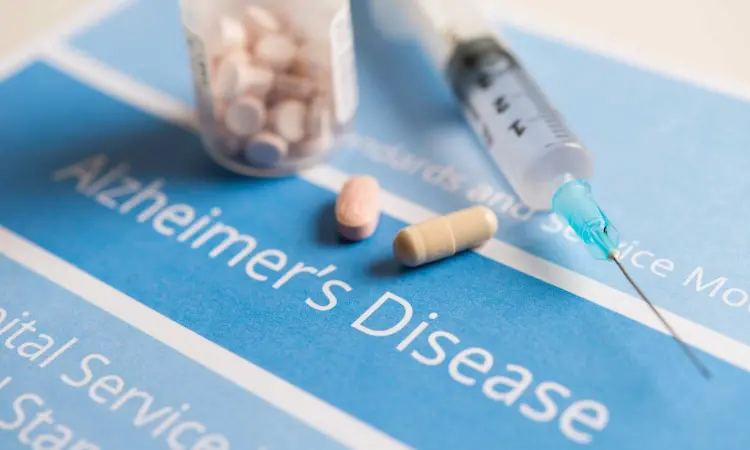- Home
- Medical news & Guidelines
- Anesthesiology
- Cardiology and CTVS
- Critical Care
- Dentistry
- Dermatology
- Diabetes and Endocrinology
- ENT
- Gastroenterology
- Medicine
- Nephrology
- Neurology
- Obstretics-Gynaecology
- Oncology
- Ophthalmology
- Orthopaedics
- Pediatrics-Neonatology
- Psychiatry
- Pulmonology
- Radiology
- Surgery
- Urology
- Laboratory Medicine
- Diet
- Nursing
- Paramedical
- Physiotherapy
- Health news
- Fact Check
- Bone Health Fact Check
- Brain Health Fact Check
- Cancer Related Fact Check
- Child Care Fact Check
- Dental and oral health fact check
- Diabetes and metabolic health fact check
- Diet and Nutrition Fact Check
- Eye and ENT Care Fact Check
- Fitness fact check
- Gut health fact check
- Heart health fact check
- Kidney health fact check
- Medical education fact check
- Men's health fact check
- Respiratory fact check
- Skin and hair care fact check
- Vaccine and Immunization fact check
- Women's health fact check
- AYUSH
- State News
- Andaman and Nicobar Islands
- Andhra Pradesh
- Arunachal Pradesh
- Assam
- Bihar
- Chandigarh
- Chattisgarh
- Dadra and Nagar Haveli
- Daman and Diu
- Delhi
- Goa
- Gujarat
- Haryana
- Himachal Pradesh
- Jammu & Kashmir
- Jharkhand
- Karnataka
- Kerala
- Ladakh
- Lakshadweep
- Madhya Pradesh
- Maharashtra
- Manipur
- Meghalaya
- Mizoram
- Nagaland
- Odisha
- Puducherry
- Punjab
- Rajasthan
- Sikkim
- Tamil Nadu
- Telangana
- Tripura
- Uttar Pradesh
- Uttrakhand
- West Bengal
- Medical Education
- Industry
Alcohol intake, even in modest amount, could accelerate Alzheimer's disease: Study

USA: A recent study published in Neurobiology of Disease showed that even modest amounts of alcohol could accelerate brain atrophy, which is the loss of brain cells, and increase the number of amyloid plaques is the accumulation of toxic proteins in Alzheimer’s disease.
Scientists at Wake Forest University School of Medicine revealed in their preclinical study that alcohol use disorder is a risk factor for Alzheimer’s disease. However, alcohol use disorder's impact on Alzheimer's disease pathology is a field of continued research.
“These findings suggest alcohol might accelerate the pathological cascade of Alzheimer’s disease in its early stages,” said Shannon Macauley, Ph.D., associate professor of physiology and pharmacology at Wake Forest University School of Medicine.
Alzheimer’s disease is the most common form of dementia, accounting for 60% to 80% of dementia cases, according to the Alzheimer’s Association.
The study was a collaboration led by Macauley and Jeffrey Weiner, Ph.D., professor of physiology and pharmacology at Wake Forest University School of Medicine, through the medical school’s Alzheimer’s Disease Research Center and Translational Alcohol Research Center.
Using mouse models of Alzheimer’s disease-related pathology, researchers used a 10-week chronic drinking approach where mice were given the choice to drink water or alcohol, mimicking human behavior regarding alcohol consumption. They then explored how voluntary, moderate consumption of alcohol altered healthy brain function and behavior and whether it altered the pathology associated with the early stages of Alzheimer’s disease.
The researchers found that alcohol increased brain atrophy and caused an increased number of amyloid plaques including a greater number of smaller plaques, potentially setting the stage for increased plaque proliferation in later life.
Interestingly, researchers also noted that acute withdrawal of alcohol increased the amyloid-beta levels, a key component of amyloid plaques that accumulate in Alzheimer’s disease.
Further analysis showed that chronic alcohol exposure poorly regulated brain and peripheral metabolism-another way to accelerate Alzheimer’s disease pathology. Macauley previously showed that elevated blood sugar increases amyloid-beta and amyloid plaques. In the current study, researchers found that even moderate drinking caused elevations in blood sugar and markers of insulin resistance, which increases the risk not only for Alzheimer’s disease but also for other diseases such as type 2 diabetes and cardiovascular disease.
The study also found that moderate alcohol use altered anxiety and dementia-related behaviors.
“These preclinical findings suggest that even moderate consumption of alcohol can result in brain injury,” Macauley said. “Alcohol consumption may be a modifiable risk factor for Alzheimer’s disease and dementia.”
Reference:
Stephen M. Day, Stephen C. Gironda, Caitlin W. Clarke, J. Andy Snipes, Noelle I. Nicol, Hana Kamran, Warner Vaughan, Jeffrey L. Weiner, Shannon L. Macauley, Ethanol exposure alters Alzheimer's-related pathology, behavior, and metabolism in APP/PS1 mice, Neurobiology of Disease https://doi.org/10.1016/j.nbd.2022.105967.
Dr Kartikeya Kohli is an Internal Medicine Consultant at Sitaram Bhartia Hospital in Delhi with super speciality training in Nephrology. He has worked with various eminent hospitals like Indraprastha Apollo Hospital, Sir Gangaram Hospital. He holds an MBBS from Kasturba Medical College Manipal, DNB Internal Medicine, Post Graduate Diploma in Clinical Research and Business Development, Fellow DNB Nephrology, MRCP and ECFMG Certification. He has been closely associated with India Medical Association South Delhi Branch and Delhi Medical Association and has been organising continuing medical education programs on their behalf from time to time. Further he has been contributing medical articles for their newsletters as well. He is also associated with electronic media and TV for conduction and presentation of health programs. He has been associated with Medical Dialogues for last 3 years and contributing articles on regular basis.
Dr Kamal Kant Kohli-MBBS, DTCD- a chest specialist with more than 30 years of practice and a flair for writing clinical articles, Dr Kamal Kant Kohli joined Medical Dialogues as a Chief Editor of Medical News. Besides writing articles, as an editor, he proofreads and verifies all the medical content published on Medical Dialogues including those coming from journals, studies,medical conferences,guidelines etc. Email: drkohli@medicaldialogues.in. Contact no. 011-43720751


